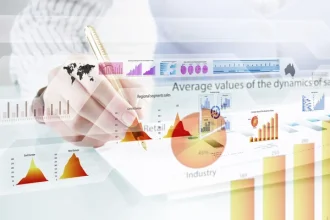
Almost every business these days relies on data in one way or another to make informed decisions and stay ahead of the competition. Data is essential for understanding what’s happening in your business, making informed strategic decisions, and improving performance. However, not all businesses treat data with the same importance. As a business owner, it’s important that you have a good understanding of what business data is, and what you can do with it to improve your business.
1. What Is Business Data?
Business data is any information about or related to your business. It can include anything from sales figures and customer data to production metrics and employee records. In order to make informed decisions, you need to first ask what is data processing and how to do it properly. In short, data analytics is the process of examining data to find trends and patterns. This can be used to inform strategic decisions, improve performance, and understand what’s happening in your business. Depending on what type of data you’re looking at, there can be different ways to analyze it. For example, if you’re looking at customer data, you might want to look at customer demographics (location, age, gender, etc.), purchase history, and loyalty/churn rates. While it’s important to know what data you have about each aspect of your business individually, the best results are gained when you combine all your findings into creating a well-thought-out strategy.
2. What Types of Business Data Are There?
As mentioned earlier, it’s important to look at your business both as a whole, and through the individual parts it’s made out of. There are many different types of business data, but some of the most important include:
- Sales data: This includes information about your sales figures, product sales, and sales channels. This data can be used to predict future sales, benchmark performance against other businesses in your industry, and determine whether you need to change the way you’re doing things.
- Operations Data: This includes information about how your business is actually running day-to-day. Information like this can be used to identify bottlenecks or areas of improvement within your company’s operations.
- Marketing Data: This includes information about your marketing efforts, such as ad campaigns, social media engagement, and other customer interaction. You can use this type of data to improve existing marketing efforts or try out new initiatives to target specific audiences. This can also be used to track ROI (return on investment) for each campaign you run.
- Financial Data: This includes information about your company’s finances, such as revenue, expenses, and profits/losses. This data can be used to make informed financial decisions and track the overall health of your business.
- Employee Data: This includes information about your employees, such as their contact information, job title, and salary. This data can be used to track employee performance, identify areas where training is needed, and make sure you’re paying your employees a fair wage.
- Customer Data: This includes information about your customers, such as their contact information, purchase history, and loyalty/churn rates. This data can be used to understand who your customers are, what they’re buying, and how likely they are to return.
- Project Data: This includes information about any ongoing or completed projects, such as the budget, timeline, and team members involved. This data can be used to track project progress, ensure all deadlines are met, and identify potential problems before they become too big.
Even though there are plenty of other groups of data your business could collect, the ones listed above are some of the most important. It’s essential to have a good understanding of all of them so you can make informed decisions about where your business should go next.
3. How Do I Analyze Business Data?
Now that you know what different types of business data are and what they can be used for, you might be wondering what exactly “analyzing business data” means. Analytics is the practice of examining data to answer questions or solve problems. The more information you have about your business, the better equipped you’ll be to determine areas for improvement and make informed decisions. There are many different tools at your disposal for analyzing business data. Some of the most popular ones include:
- Business Intelligence (BI) Tools: BI tools allow you to combine data from different sources into one place so you can easily analyze it. This can be helpful for understanding how different areas of your business are performing individually and together.
- Data Visualization Tools: These tools use graphs and charts to help you understand large amounts of data more easily. This can be helpful for spotting trends and patterns that would be difficult to see in text form.
- Statistical Analysis Tools: These tools allow you to run statistical tests on your data to help you understand it better. This can be helpful for identifying correlations or relationships between different factors.
If you’re not sure how to analyze your data or need help getting started, you can always hire a data analyst or consultant. They can help you understand your data and use it to make informed decisions about your business.
4. Why Is It Important?
The amount of business data is growing exponentially, and this makes it an increasingly valuable resource that needs to be properly utilized. While we mentioned the different types of data you can collect and their use in rough outlines, it’s important to understand all the different ways this data is important for your business. For businesses in competitive markets, having a better understanding of what’s happening in your business with regard to data can give you a competitive edge. Additionally, by understanding which business initiatives are performing well and which ones need improvement, you can focus your efforts in the right places and avoid making costly mistakes. It can also be used to track the success (or failure) of your marketing campaigns. By understanding which campaigns are resulting in sales and which ones aren’t, you can focus your efforts on the ones that are most successful.

With all the information available about how to use business data and what you can do with it, there’s no reason businesses shouldn’t be taking advantage of this valuable resource. It’s important to know what types of data your business is collecting, as well as some of the most popular ways it can be analyzed. Once you understand all that data does for your business, you can start making informed decisions that will help your business grow.

Founder Dinis Guarda
IntelligentHQ Your New Business Network.
IntelligentHQ is a Business network and an expert source for finance, capital markets and intelligence for thousands of global business professionals, startups, and companies.
We exist at the point of intersection between technology, social media, finance and innovation.
IntelligentHQ leverages innovation and scale of social digital technology, analytics, news, and distribution to create an unparalleled, full digital medium and social business networks spectrum.
IntelligentHQ is working hard, to become a trusted, and indispensable source of business news and analytics, within financial services and its associated supply chains and ecosystems










